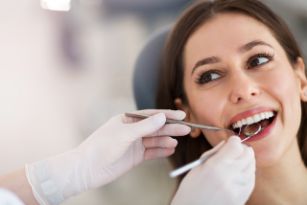
Sadly, an estimated 53,000 people in the U.S. are newly diagnosed with oral cancer each year, or 132 people each day. Oral cancer is increasingly being found in young patients without a history of smoking. However, although oral cancer rates are on the rise, there is a ray of hope: The survival rate is 85-90% when oral cancer is found and treated early. And early detection is incredibly convenient because every checkup with a dentist in Inwood Village includes an oral cancer screening. Keep reading to learn more about this important topic and find out how fast and easy life-saving screenings are!
What Are the Risk Factors For Oral Cancer?
Here are several common risk factors:
- Smoking or using chewing tobacco
- HPV
- A weakened immune system
- Heavy drinking
- Frequent sunburns (this increases your risk of developing a type of skin cancer called melanoma that often shows up on the border of the lips)
- Age
Also, keep in mind that people can develop oral cancer who have none of these risk factors.
How Can You Lower Your Risk?
Prevention efforts combined with early detection is the best way to combat oral cancer. First, either don’t start using tobacco or talk with a dentist or doctor about help with quitting. Also, eating a healthy diet with lots of fruits and vegetables has been found to lower the risk of many cancers in general, including oral cancer.
Wear sun protection if you’ll be in the sun for long and minimize prolonged exposure. Finally, limit alcohol consumption to one drink per day for women or two drinks per day for men.
What Is a Screening Like?
Oral cancer screenings are done at every checkup and are fast, easy, and non-invasive. First, a dentist and hygienist will visually examine all the soft tissues in your mouth and throat, including your lips, cheeks, palate, and under your tongue.
Some dentists also use a special tool called a VELscope light so they can be as thorough as possible. This special light helps them see potentially suspicious areas that they can’t with the naked eye.
And, since detection is easiest when you and your dentist work as a team, they may ask if you’ve noticed any of the following:
- Any sores or lesions that haven’t healed on their own within two weeks.
- A persistent sore throat.
- Stiffness or pain in the jaw.
- A lump or bump that you didn’t have before.
- A chronic feeling that something is stuck in your throat.
- Trouble chewing or swallowing.
You may feel alarmed if you notice any of these symptoms, but remember that there are many harmless conditions that appear the same way, including cold sores or benign lumps of fatty tissue.
With a professional evaluation, either the issue will be diagnosed as something benign or you’ll be referred to a specialist for further evaluation.
The importance of early detection can’t be overemphasized. And when it’s as easy as scheduling a checkup, there’s no reason not to be screened!
About the Author
Dr. Davina Prida earned her degree at Baylor College of Dentistry in Dallas, where she graduated with a Doctor of Dental Surgery (DDS). She is a member of the Dallas County Dental Society, Texas Dental Association, American Dental Association, and the American Academy of Cosmetic Dentistry. Dr. Prida is also a member of the Texas Army National Guard. One of her main focuses is creating beautiful Smiles. She ia a Top Dallas Dentist Providing High Quality Dental Care, General Dentistry, Cosmetic Dentistry, Dental Implants, and Reconstructive Dentistry. Dr Davina Prida is fulfilling her vision of bringing the very best in cosmetic dentistry, reconstructive dentistry and general dentistry to Dallas at Inwood Village Dental. Dr. Prida’s approach of dental excellence and her use of advanced techniques, create the most natural, beautiful smiles possible. Dr. Prida is Dallas’ top cosmetic dentist, creating amazing smile makeovers with veneers, dental implants, dental crowns and bridges and Invisalign®. If you have questions about your dental treatment or dental care options, don’t hesitate to contact her at Inwood Village Dental or at (214) 352-2777.
